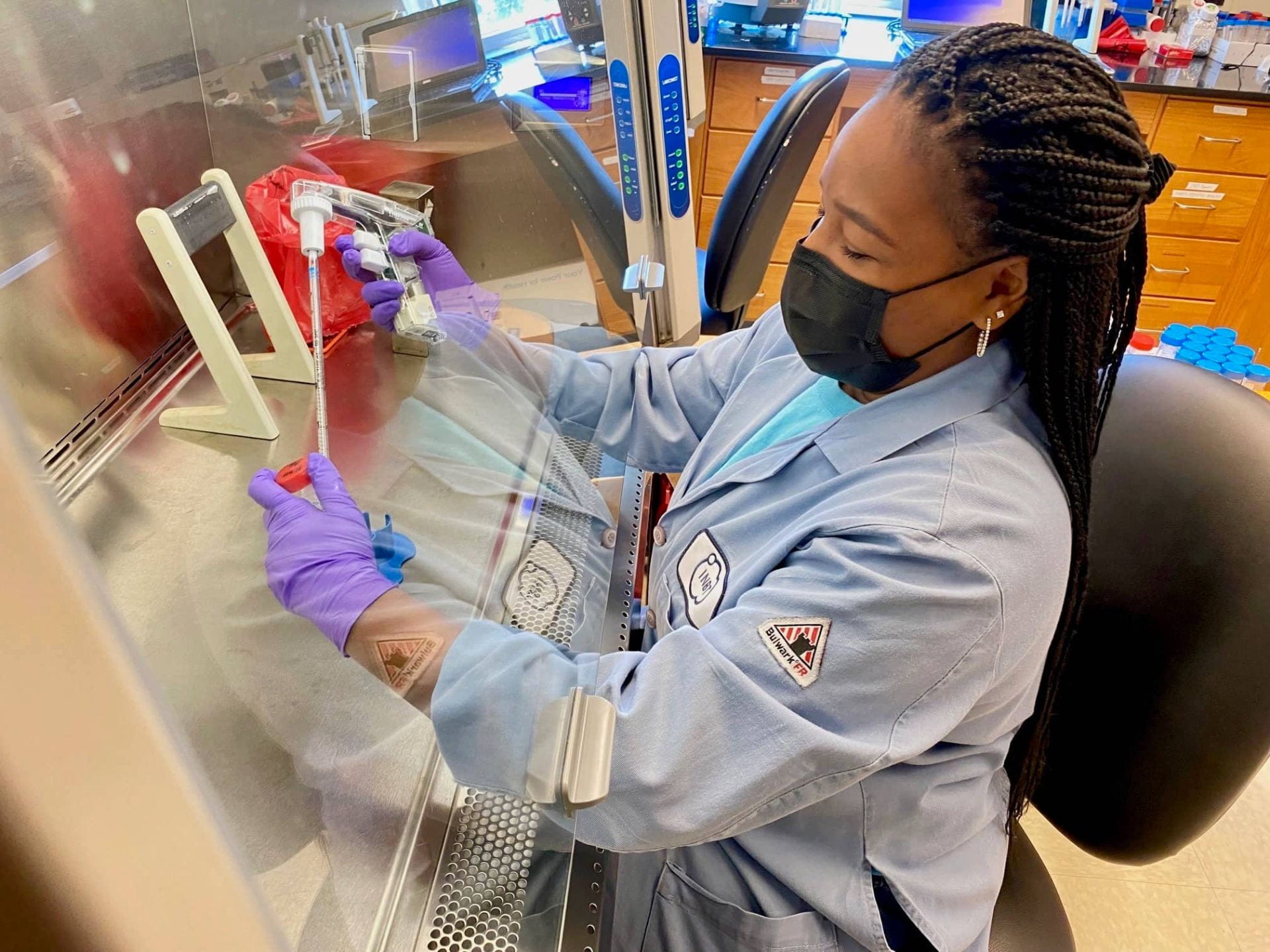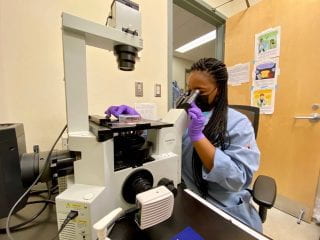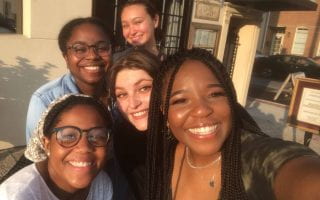
Breanna Kilgore learning pipette skills needed for cell culture. Photo courtesy Johns Hopkins Institute for NanoBioTechnology.
Junior Breanna Kilgore is a Path Scholar from El Dorado, Arkansas, majoring in biomedical engineering. She got a hands-on introduction to laboratory research last summer thanks to landing a coveted REU at Johns Hopkins University. Read her report from Baltimore to learn more about her summer research and her tips on how to survive –– and thrive! –– in a competitive program.
This summer, I had the pleasure of being a part of the Institute of NanoBioTechnology Research Experience for Undergraduates (REU) at Johns Hopkins University. For this program, I spent 10 weeks conducting graduate-level research, participating in professional development seminars, and workshops on science communication. While here for the summer, I was exposed to the ins and out of research, learning the importance of the scientific method and technical skills used in the lab. REU programs are designed for students to gain research experience to prepare them for future research careers or enter into graduate school. Institutions all over the country host REU programs each summer and I had the help of the staff in the Honors College and the Office of Nationally Competitive Awards to apply to these different programs. The application process consists of writing a personal statement, letters of recommendation, and handing in your transcript. I spent tons of time writing drafts of my personal statement and made sure to ask for letters of recommendation weeks before the application deadline.

Breanna examines and photographs stem cells under a microscope. Photo courtesy Johns Hopkins Institute for NanoBioTechnology.
My particular project focused on characterizing the secretion of endothelial-cell-derived extracellular vesicles under different levels of shear stress. Endothelial cells line the inside of the veins and arteries that make up the cardiovascular system. This vasculature is responsible for circulating blood through the entire body and back to the heart for reoxygenation. Extracellular vesicles are small “cargo carriers” secreted from the cell and serve as the main communication vehicle between cells. I was responsible for investigating the effect shear stress, caused by fluid flow, has on the secretion of the extracellular vesicles by the endothelial cells. We modeled this system with a microfluidic device, where we placed the cells in a 2-D channel to test shear stress.
I conducted this research under the guidance of a Ph.D. student, Sydney Connor, in Dr. Sharon Gerecht’s lab, which focuses on 3-D culture environments, tissue engineering, and stem cell self-renewal and differentiation. My typical routine consisted of spending about 7-8 hours a day in the research lab with my mentor, working on my project or learning different technical skills such as immunofluorescent imaging, cell culture, fabrication and more. At the end of the summer, I formally presented my research at the Johns Hopkins CARES symposium, an annual research conference designed for all JHU summer interns to present their research to all faculty and staff.
Through this experience, I encountered challenges but learned so much. In the beginning, I was very overwhelmed by the overload of information in the field I was doing research in. I hadn’t done any research before this summer, so I had to learn basic lab practices in addition to getting familiar with the terminology and methods of the research I was doing. In order to help digest the research presented to me, I often wrote down everything that I learned that day in order to review all the information. I also asked my mentor and other lab members tons of questions anytime I was curious or confused by what we were doing. Asking questions is the most important thing you can do in science, it helps you gain better understanding and could lead to future discoveries. Never be afraid to ask “stupid” questions, basic understanding is key to developing a solid research project and ensures that you cover all of your bases.
Overall, spending 10 weeks in a research lab following a Ph.D. student around taught me so much about science, graduate school, and even life. I learned that understanding classroom concepts are important to research when you are applying everything you have learned to real projects. I learned something new every day while I was in the lab and that made me enjoy conducting research, because I was always discovering new things. However, I enjoyed my time spent outside the lab as well. Every weekend was a new adventure and that made my summer in Baltimore even more exciting. I had the chance to visit nearby cities like Washington, D.C. and New York City, which made the experience even better. Spending time getting to know other students from across the country was enriching to my time there, as well –– I definitely made some lifelong friends.
If you are wanting to gain REU experience, apply to as many programs as possible. I spent time researching different programs based upon my research interest at different schools across the country. If you are interested in research, apply to an REU; you won’t regret it.

